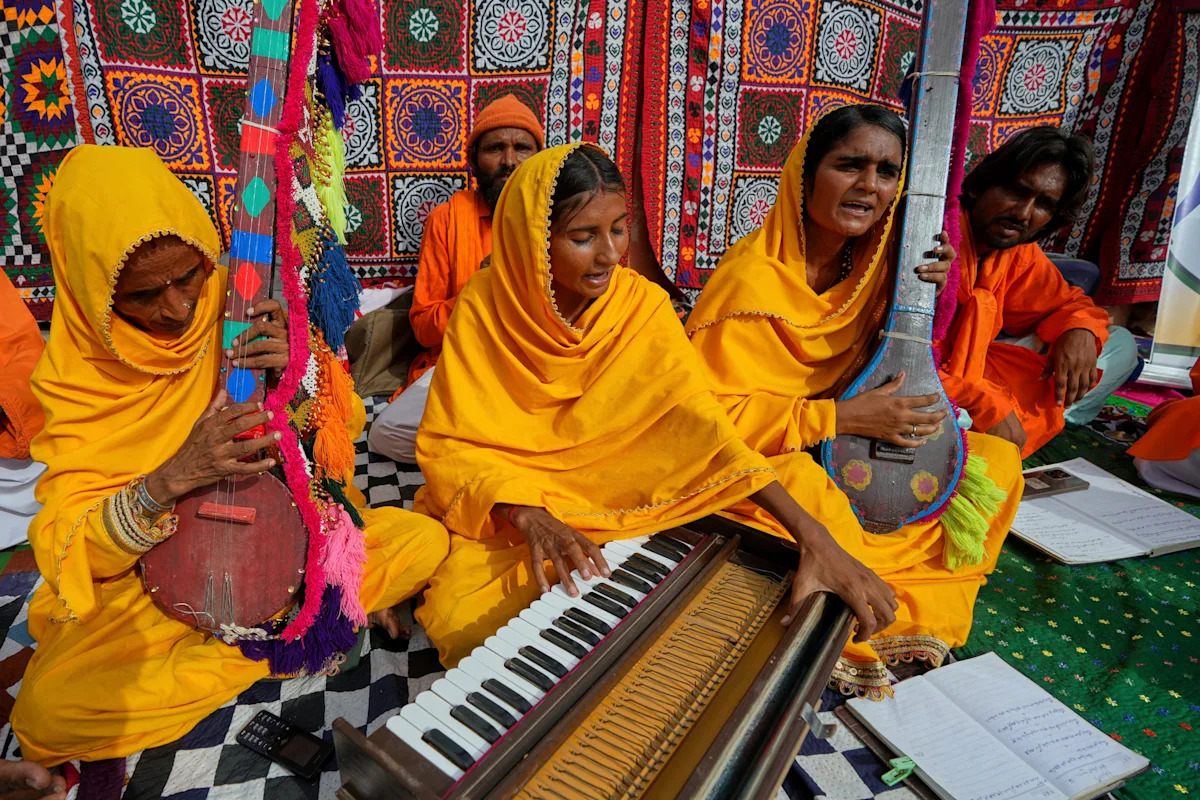Science
Pakistani Musicians Mobilize Folk and Rap to Combat Climate Crisis

Villagers in Umerkot, Sindh, are uniting against climate change through the powerful mediums of folk music and rap. Local artist Sham Bhai captivates audiences with her poignant songs, addressing the harsh realities faced by communities ravaged by extreme weather events. Her lyrics resonate deeply: “We are the people of the south. The winds seem to be blowing from the north. My heart is burned from seeing the collapsed houses in the rain.”
These sentiments reflect the devastating impact of severe flooding in 2022, which led to over 1,000 rain-related deaths in Sindh alone. The catastrophic deluges displaced millions, damaging homes, farmland, and critical infrastructure. Sham, an 18-year-old singer, has spent the past two years performing across a dozen villages, using her songs to teach residents about climate adaptation and resilience.
Music as a Tool for Climate Awareness
In a region where literacy rates drop to 38% in rural areas, folk music serves as a vital tool for communication. Sham explained, “When we give a message through song, it is easy to communicate to people because they understand it.” By singing in Sindhi, the local language, she connects more effectively with her audience than if she used the national language, Urdu.
The lyrics of her songs reflect the lived experiences of villagers, particularly the vulnerability of women and children during extreme weather events. “Women and children face hardship during the rains,” she said, emphasizing the additional burdens they bear when men leave for work.
The agricultural landscape of Sindh is changing due to climate change, with farmers like Ghulam Mustafa Mahar adapting to unpredictable weather patterns. “The monsoon season used to come on time, but now it starts late,” he noted, highlighting the challenges that farmers face as they shift from summer crops to winter ones.
Rap Campaigns for Climate Justice
In a parallel effort, activist Urooj Fatima, known as Sindhi Chhokri, is harnessing the power of rap to raise awareness about climate change. Following the floods that devastated her village, Urooj recognized that many in rural areas were unaware of the climate crisis. “Through rap, we can reach out to hundreds of thousands of people through our voice and our message,” she stated.
Although hip-hop is not widely popular in Pakistan, Urooj believes it resonates because of its roots in storytelling and social commentary. She has created rap songs addressing climate issues and performed them at various festivals, amplifying her message through social media. In one of her impactful verses, she questions the accountability of local authorities: “Where was the Balochistan government when the floods came? My pen thirsts for justice.”
Urooj and her sister, Khanzadi, actively campaign for climate justice, planting trees and visiting villages to spread awareness. Urooj emphasizes the disproportionate effects of climate change on women and girls, who face unique challenges regarding displacement, education, and health.
“Climate change affects a person’s whole life,” she explained. “If a flood comes from above, they face more difficulties.” Urooj acknowledges that her activism sometimes invites controversy in conservative communities, but she remains steadfast in her commitment to speak out against social injustices.
Community Response and Future Actions
The response to the musical campaigns has been encouraging. Sham noted that people are beginning to act on their advice, planting trees and reinforcing their homes to withstand severe weather. The integration of music into climate education has fostered a sense of community resilience in the face of adversities.
Despite the challenges ahead, these artists exemplify the potential of cultural expression to foster awareness and mobilize action against climate change in Sindh. Their efforts highlight the pressing need for broader initiatives that address both environmental and social issues, particularly in rural areas.
As climate impacts become increasingly severe, the voices of musicians and activists like Sham and Urooj are crucial. By engaging their communities through accessible forms of art, they are not only raising awareness but also inspiring action towards a more resilient future.
-

 Technology5 months ago
Technology5 months agoDiscover the Top 10 Calorie Counting Apps of 2025
-

 Technology3 weeks ago
Technology3 weeks agoOpenAI to Implement Age Verification for ChatGPT by December 2025
-

 Health3 months ago
Health3 months agoBella Hadid Shares Health Update After Treatment for Lyme Disease
-

 Health3 months ago
Health3 months agoAnalysts Project Stronger Growth for Apple’s iPhone 17 Lineup
-

 Health3 months ago
Health3 months agoErin Bates Shares Recovery Update Following Sepsis Complications
-

 Technology5 months ago
Technology5 months agoDiscover How to Reverse Image Search Using ChatGPT Effortlessly
-

 Technology3 months ago
Technology3 months agoElectric Moto Influencer Surronster Arrested in Tijuana
-

 Technology2 months ago
Technology2 months agoDiscover 2025’s Top GPUs for Exceptional 4K Gaming Performance
-

 Technology5 months ago
Technology5 months agoMeta Initiates $60B AI Data Center Expansion, Starting in Ohio
-

 Technology5 months ago
Technology5 months agoRecovering a Suspended TikTok Account: A Step-by-Step Guide
-

 Health5 months ago
Health5 months agoTested: Rab Firewall Mountain Jacket Survives Harsh Conditions
-

 Lifestyle5 months ago
Lifestyle5 months agoBelton Family Reunites After Daughter Survives Hill Country Floods









